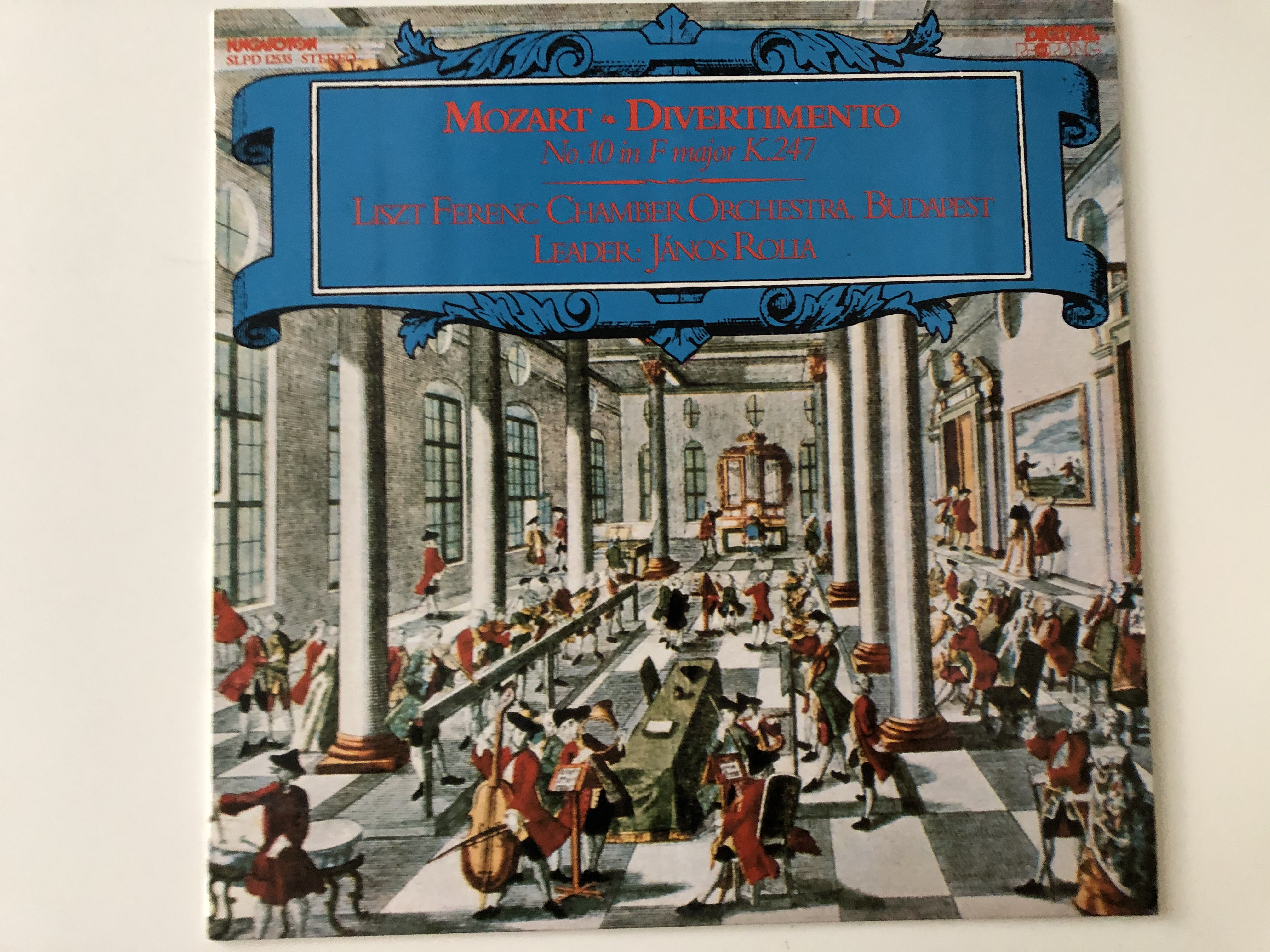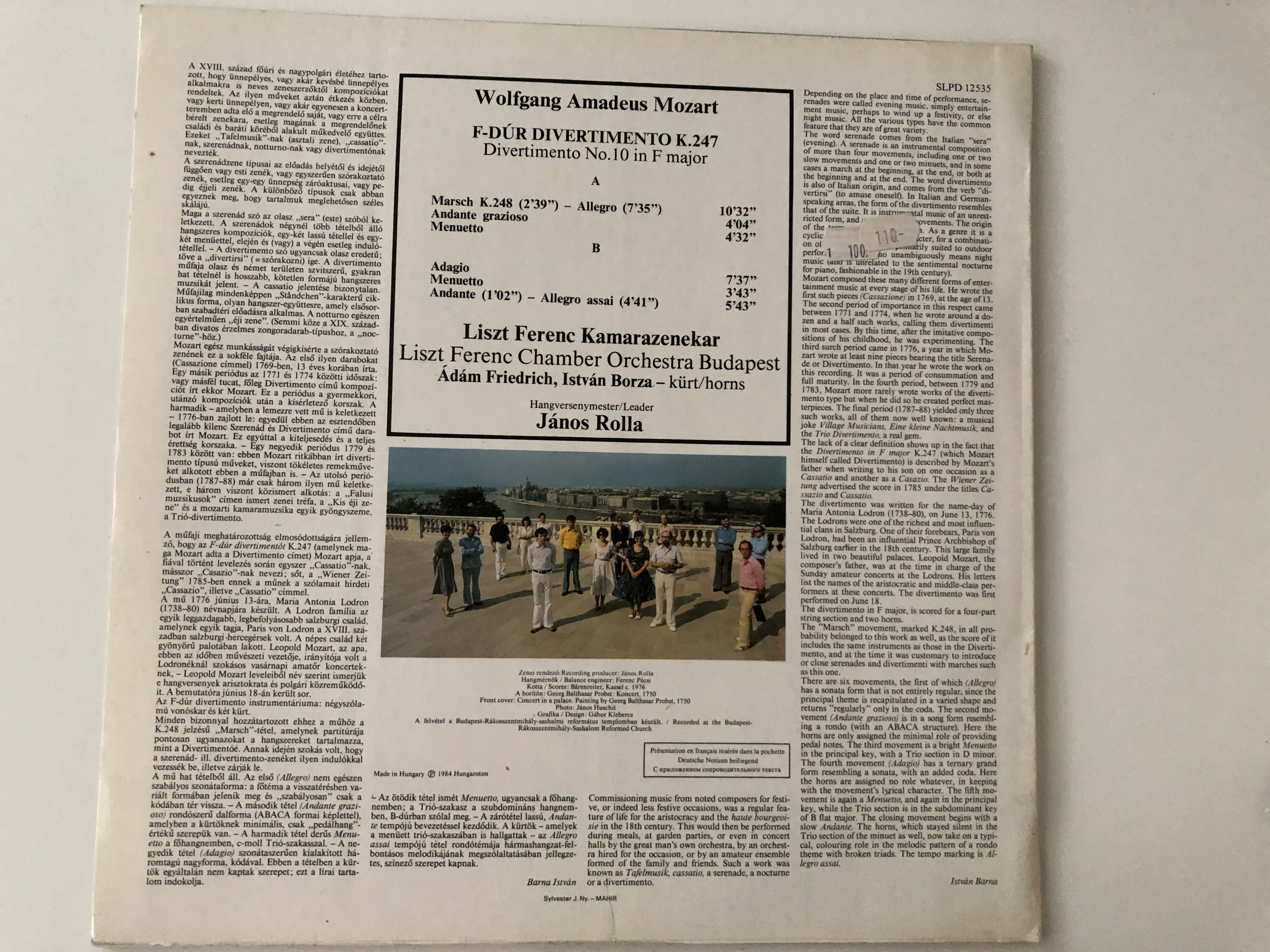Description
Mozart – Divertimento No.10 In F Major K.247 / Liszt Ferenc Chamber Orchestra, Budapest, János Rolla / Hungaroton LP 1984 Stereo
SLPD 12535
Wolfgang Amadeus Mozart’s No. 10 Divertimento in D major is a six - movement work. Köchel Registry Number: K. 334 (320b). Items:
- Allegro
- Themes with different variations. Andante
- Menuetto
- Adagio
- Menuetto
- Rondo. Allegro
He wrote the piece for string quartet and two horns in the summer of 1779.
The hustle and bustle of the Salzburg years is becoming increasingly unbearable for him at this time. Although the princes tolerate composing symphonic works (three of his symphonies from this period), the small number of these works shows that Mozart receives little encouragement and nothing encouragement. Some occasional compositions are also born around this time: the serenade in D major (K. 320) and this divertimento of the same tone .
Probably the same musicians played this work as the K. 287 divertimento: for the first violin , Mozart wrote virtuoso vocals in both works. The serenade tone is used by the composer in the corner movements of the piece, while in the “inner” movements he gives expression to the personal utterance.
For the second movement theorem in D minor, he chose a particularly ringing, gloomy theme. This is no longer the usual sound of gallant night music. It fits much more with the lonely, tearing, resigned man who has matured into adulthood through the bitter experiences of Salzburg years; but the French-graceful first minuet betrays the gloom inherent in the same way as the second dance piece, both trios of which were written in a minor tone. The first minuet, by the way, is one of the pieces that has grown extremely popular out of the series and is heard in a number of adaptations.
Wolfgang Amadeus Mozart No. 10-es D-dúr divertimentója hattételes mű. Köchel-jegyzékszáma: K. 334 (320b). Tételei:
- Allegro
- Thema mit sechs Variationen. Andante
- Menuetto
- Adagio
- Menuetto
- Rondo. Allegro
A darabot vonósnégyesre és két kürtre írta 1779 nyarán.
A salzburgi évek nyűge egyre elviselhetetlenebb számára ebben az időben. A hercegérsek eltűri ugyan, hogy szimfonikus műveket komponáljon (három szimfóniája való ebből a periódusból), e művek kis száma azonban azt mutatja, hogy bátorítást keveset kap Mozart, ösztönzést pedig semmit. Néhány alkalmi kompozíció is születik ez idő tájt: a D-dúr szerenád (K. 320) és ez az azonos hangnemű divertimento.
Valószínűleg ugyanazok a zenészek játszották ezt a művet, mint a K. 287-es divertimentót: az első hegedű számára Mozart mindkét műben virtuóz szólamokat írt. A szerenádhangot a darab saroktételeiben alkalmazza a zeneszerző, míg a „belső” tételekben személyes mondanivalónak ad kifejezést.
A második d-moll variációs tétel számára különös csengésű, komor témát választott. Ez már nem a gáláns éji zenék megszokott hangja. Sokkal inkább illik ahhoz a magányos, tépelődő, rezignált emberhez, akit a salzburgi esztendők keserű tapasztalatai érleltek felnőtté; de a franciásan kecses első menüett éppúgy elárulja a mélyén rejlő komorságot, mint a második táncdarab, amelynek mindkét triója moll hangnemben íródott. Az első menüett egyébként egyike azoknak a daraboknak, amelyek a sorozatból kinőve váltak rendkívül népszerűvé, és számos feldolgozásban hangzanak fel.
Tracklist:
| Divertimento No.10 In F Major |
(19:08) | ||
| A1a | Marsch K.248 |
2:39 | |
| A1b | Allegro |
7:35 | |
| A2 | Andante Grazioso |
4:04 | |
| A3 | Menuetto |
4:32 | |
| B1 | Adagio |
7:37 | |
| B2 | Menuetto |
3:43 | |
| B3a | Andante |
1:02 | |
| B3b | Allegro Assai |
4:41 |
- Design – Gábor Klebercz
- Engineer [Balance engineer] – Ferenc Pésci
- Horns – István Borza, Ádám Friedrich
- Leader – János Rolla
- Liner Notes – István Barna
- Orchestra – Liszt Ferenc Kamarazenekar
- Painting [Front cover: Concert in a palace] – Georg Balthasar Probst
- Photography By – János Huschit
- Producer [Recording producer] – János Rolla
























